Nursery
EYFS Team (ID 1253)
-
Mrs RileyEYFS Lead
Mrs Riley
Reception Teacher
-
Mrs ArcherNursery Teacher
Mrs Archer
-
Mrs BraimReception Teacher
Mrs Braim
-
Mrs BrowneHLTA
Mrs Browne
-
Mrs HevinghamHLTA
Mrs Hevingham
-
Mrs JohnsonTA
Mrs Johnson
-
Miss AyaizTA
Miss Ayaiz
-
Miss HamptonTA
Miss Hampton
-
Mrs TuckerEYFS TA
Mrs Tucker
-
Mrs SalvinEYFS Ancillary TA
Mrs Salvin
school readiness information booklet for parents.pdf
Planning Overviews
curriculum overview nursery autumn 1.pdf
curriculum overview nursery spring 1.pdf
Project Learning in the EYFS
What is project work?
At Woodlands we take inspiration from colleagues working in pre-school settings in Reggio Emilia in Italy. We aim to bring this inspiration to our curriculum and everyday practice. The city of Reggio Emilia is recognised worldwide for its innovative approach to education which many pre-school programmes around the world have tried to emulate.
Our daily project work provides a rich context for children working within mixed learning groups to communicate and share what they discover and know. Working in this way allows children to work collaboratively and develop the idea that together, they can achieve more than if we work on our own.
We have a range of project work areas the children can access everyday…
Snake Garden
The children learning in Snake Garden have been investigating ‘What is in Snake Garden? They have used natural resources to develop role play together.
Children have welcomed chickens in to their ‘chicken coop’ and have spent time getting to know them and taking care of them. Educators have been learning about the life cycles of animals and plants.
Creatures have been further investigated as the children wonder ‘What’s underneath?’ the soil or the logs.
Outside
Children are being supported in the outside area to share their ideas and listen to others as they develop their collaborative learning skills.
A wider range of resources have been introduced to the outside area as the weather has improved this term (paints, chalks, plants, gardening, water, seeds, quiet story areas). The children, through collaborative reflection, have expressed interest in developing planting spaces and areas to attract small creatures such as butterflies. The educators and the children have been working together to develop and improve the ‘garden’.
Alongside this learning children are enjoying building and much of this learning has supported children’s geographical land scientific knowledge. Recently the children have been asked by the educators ‘I wonder what you know about holidays’.
Children have reflected on their own experiences of holidays and begun to develop their shared ideas as they build caravans, trains, aeroplanes, holiday houses etc.
“I want to go on holiday in a submarine and visit the Eiffel Tower!”
“We are going on holiday in a caravan…we need lots of toys in the back of our caravan!”
Piazza
The children have been incorporating their ideas and experiences of the animals in EYFS into their story telling and writing. The educators have supported this through the use of the text ‘Chicken Licken’ and then asked the children the question.. ‘What happens next?’
“They went to Taco Bell for dinner!”
“The chicken goes in the castle and he gets a sword and then the chicken is the queen!”
Children have developed their ideas using drawing, writing, role play and discussion. They plan to write story endings in booklet/story form next.
Café
To develop the children’s knowledge about the United Kingdom the children have been learning about the country ‘Wales’. Children brought lots of experiences about Wales to their own and the groups learning through family trips and holidays.
“I went to Barmouth beach and had fish and chips and hot donuts. They speak English but it is a different country.”
The educators uses videos, google maps and texts to support children’s ideas and thinking. They investigate castles and the history relating to the castles using a range of resources (paint, pen, clay, and blocks).
“The castle has got turrets the knights used to hide behind them.”
Welsh farms are then investigated and Welsh Rarebit is made….
“The cheese is in Wales and then it comes to the shops in England.”
Block Area
Recently in block area the children have been investigating ‘transport’.
The educator and the children have worked together to develop their knowledge and understanding about steam trains and how they work.
They made a trip together to the library for information books about transport, this has helped inform the children’s designs and writing.
The children have been working both individually and collaboratively to develop their ideas and build their designs.
We do hope that you enjoy reading about the project your child is involved in. Please take some time to look at the Project Journals within the unit.
Mathematics in Nursery
Short, medium and long term planning for mathematics in Nursery is based on the new EYFS curriculum guidance, Development Matters and to fit with the intent of the curriculum for our school. It is also underpinned by guidance from NCETM, NRICH and White Rose Maths. There are many opportunities for the children to apply and develop their numeracy skills throughout the sessions. Many of these give the children the opportunity to solve number problems in everyday situations. Children also develop knowledge and understanding of instructional language to support this learning.
- During snack time children are supported to experience a weekly mathematics focus which is rotated on a half termly basis. This is to ensure children experience full coverage as part of a spiral curriculum. Educators offer a range of learning activities to cover each curriculum area. They cover;
- Cardinality and counting
- Comparison
- Composition
- Measure
- Pattern
- Shape
- During the daily register time children collaborate to count each other and this gives opportunity for children to discuss and develop their ideas related to numbers and the relationships between them. Children represent number in many different ways and this gives the opportunity for the teacher to support learning relating to counting, cardinality and number composition.
- Singing Assemblies – It is vitally important that children experience nursery rhymes regularly, particularly rhymes related to number. This reinforces children’s knowledge of number, changes to number and the patterns and relationships between and within numbers.
There are extensive opportunities for children to embed and develop their mathematics knowledge further during project learning sessions.
As always we welcome every opportunity to share children’s learning within school with parents and carers at home and also learning at home with the educators in the setting. We regularly send home children’s ‘Learning Journeys’ over the weekend to keep up a shared dialogue between Nursery and home regarding children’s learning experiences and also offer offer ‘Weekend WOW’ slips for parents/carers to share home experiences with us. In order to further develop the relationship between Nursery and home we offer regular ‘Stay and Learn’ sessions where we welcome parents/carers into setting to share learning experiences with the children. One of the most recent of these sessions had a mathematics focus.
Previous National and International Project work
We Think Everywhere – Digital Landscapes of Possibility and New Creative Pedagogies
In previous academic years we have been lucky to receive funding from Erasmus+ (European Union Funding) to be part of a three-year project researching the use of digital media and the creative opportunities it offers to young children. We have worked with a network of schools in the UK and in Sweden to share our ideas and to discuss, as critical friends, the best ways to support our children to learn.
attendance leaflet for nursery 2024.pdf
September in Nursery
Nursery - September Update
What a lovely start we have had to the year in Nursery. It has been wonderful welcome back the children who previously attended Nursery and the children new to the setting this term. The children have begun to establish new connections with each other, the adults in setting and their learning environments. They have adjusted to their routines beautifully as they have settled in this month.
Over the past few weeks, we’ve introduced our school rules—Ready, Respectful, and Safe—which help guide behaviour and support a calm and purposeful atmosphere in Nursery. We’ve also begun exploring our DREAM values: Determination, Resilience, Equity, Aspiration, and Relationships. These are now becoming embedded in our daily routines and are helping to promote shared learning and belonging within our setting.
The learning focus over the past few weeks has supported the children to develop both their social and communication skills and their developing relationships. The children have been sharing their ideas and knowledge of their own families and developing understanding and language around their own feelings. Educators have used a range of books to support this learning. Children have represented their ideas using mark making, painting, storytelling, role play and small world resources.
Forest School –
The children in Nursery spend two days each week learning in the natural outdoor environment when they have the opportunity to experience active and purposeful learning and develop their knowledge, understanding and relationship with the natural world around them. In Forest School this month the children have developed shared narratives as they have begun to role play some familiar traditional stories. We have developed narratives around the stories Goldilocks and The Three Little Pigs!!!!
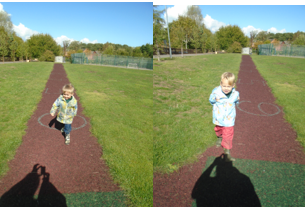
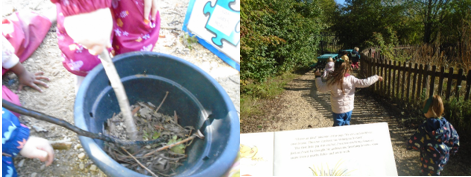
Project Learning -
Across our learning environments, the children have been engaging in a wide range of opportunities that support exploration, creativity, and communication. In the workshop area, they’ve been thinking carefully about animals and exploring what lives under the sea. The block area has sparked conversations about home life, with children enthusiastically building homes and shops inspired by their communities.
In the role-play area, children have been using dough to strengthen fine motor skills while incorporating it into imaginative cooking scenarios. Outdoors, the building area has seen children designing obstacle courses and beginning to explore different types of vehicles. Meanwhile, in Snake Garden, children have been making thoughtful observations of the natural world, investigating the bugs and wildlife found in our school garden.
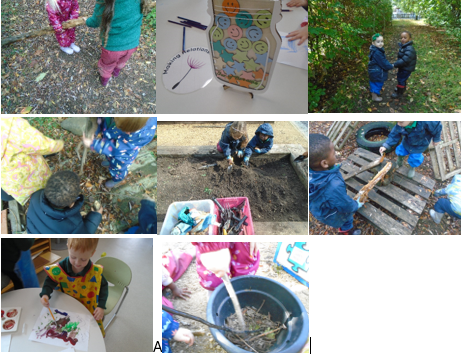
We are incredibly proud of the strong start the children in Nursery have made this term. We are also grateful for the support of our children’s parents and carers who offer invaluable collaboration and support.
October in Nursery
We have had a super month in Nursery!
Forest School –
During walks to around the grounds of the school and in Forest School the children have been taking a closer interest in the natural world around them.
The children who attend Nursery in the morning have observed some spiky growth type things on some leaves on selected trees outside.
They wondered what they might be......
'ladybugs' 'caterpillars' 'butterflies'
One of the children suggested to look at photos to find out what they could be......after research together.........we found out they are called 'Spindle Galls' - which are a home that microscopic mites live in!
Much excitement and interest has developed as some of the children have investigated and then revisited the 'Spindle Galls'. They have begun to change! The children have noticed some holes developing on the leaves and the leaves have begun to change colour and fall on the floor. The children are wondering where the mites will live if they have not got their Spindle Gall homes on the leaves........
The children who attend afternoon Nursery have wondered what may live in the holes of a large tree....monsters, spiders, ladybugs? They have collected 'gifts' (sticks, feathers, stones) to leave in the holes for the creatures who may live there.
On revisiting the tree the children have discovered some of the gifts they left for the creatures who live there have gone! A collective narrative about the creatures who live deep, deep down in holes is evolving amongst the children.
The autumnal changes in nature have also been explored and reflected upon as the children explore and notice the closer details of the natural environment around them.
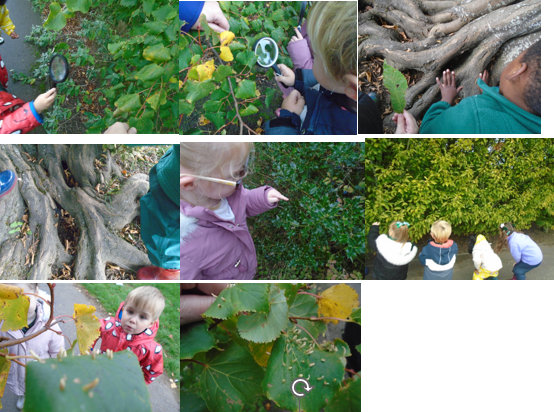
In other learning the children have been strengthening their muscles in a range of physical learning opportunities such as throwing and catching and riding bikes and scooters. Children also regularly run and walk around the school track and up and down steps as they develop their core strength and resilience.
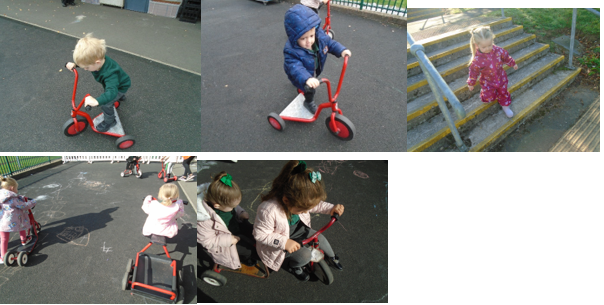
Mathematics –
Within our maths learning this month, learning has centred around building a strong foundation in early number understanding through practical activities and developing number sense through our project learning time.
Children have the opportunity to deepen their early number sense through focused daily maths sessions linked to practical experiences in snack time. Children have been learning about ‘quantities’ up to three and are developing their ability to match quantities to numerals.

Project Learning
Throughout October children have been immersed in a rich variety of enquiry-based learning experiences across different areas of the learning environment, encouraging creativity, collaboration, and critical thinking.
🏰 Block Area – Exploring Castles and Patterns
Children have been investigating the architectural features of castles, focusing on repeating patterns and shapes found in brickwork and flooring. Using a range of construction materials and shape resources, they created their own representations, developing spatial awareness and early design skills.
📚 Role Play & Book Corner – Storytelling and Imaginative Play
Through story exploration, children have been developing their understanding of narrative structure by creating their own story ideas and sequences. These ideas have been brought to life in the role play area, where children have transformed into characters, using imaginative play to extend their storytelling.
🌊 Workshop – Under the Sea
In the workshop area, children have been investigating marine life, including seahorses, sharks, jellyfish, and more. Using a variety of materials and techniques, they represented their ideas creatively, building knowledge of the natural world and expressing their understanding through art and design.
🚗 Outdoor Building – Transport and Movement
Outside, the children explored vehicles and ways we travel from one place to another. They used construction resources and mark making to represent different modes of transport, sharing their ideas with educators and peers.
🐛 Snake Garden – Investigating the Natural World
In the Snake Garden, children have been making close observations of the natural environment, identifying plants and insects, and making connections between the bugs they find. These experiences have supported their scientific thinking and deepened their appreciation for the world around them.
Across all areas, children have been encouraged to express their thinking through a variety of mediums. It’s been a joy to see their curiosity flourish as they explore, create, and learn together.
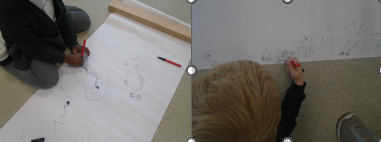
October has been full of celebrations!
We have been learning about the celebration of Diwali in Nursery. The children have been creating Diya lights, rangoli patterns and dancing and wearing traditional clothes.
We were also thrilled to welcome so many parents and carers to our Autumn Stay and Learn sessions. All the children were fabulous, and we hope you and your children enjoyed sharing the activities with each other, their parents and carers and the EYFS staff. We were extremely proud of all the children in Nursery.
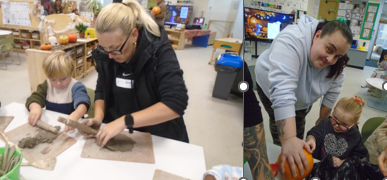
November in Nursery
Another busy month in Nursery!
Literacy –
The children have been further developing their knowledge of stories this month as they have focussed on the books ‘Our House’ by Michael Rosen, ‘Stickman’ by Julia Donaldson ‘One Snowy Night’ by Nick Butterworth and ‘Oi Frog’ by Kes Grey. Children have developed their listening and attention skills, recall of stories, recognition of rhyme, prediction skills and ability to retell parts of familiar stories. The children have represented their ideas through a range of opportunities and media including mark making, role play, movement and music.
Mathematics –
This month, the children have been busy developing their early maths skills through lots of practical activities. We’ve been continuing to explore counting and what it really means to find out “how many” objects there are altogether. The children have been practising careful counting — saying one number for each object (1:1 correspondence) — which is helping them to become more accurate and confident when working with numbers. Alongside this, they are beginning to use the language of ‘one’ and ‘lots’ and ‘more’ and ‘less’ when comparing groups, which supports their growing understanding of quantities.
In our shape, space and measure learning, the children are learning to recognise and name some 2D shapes, focusing especially on circles and triangles. The children have been on ‘shape hunts’ as they notice shapes and patterns in their inside and outside environments.

Mathematics Stay and Learn,
Thank you to those parents and carers who were able to attend the Maths Stay and Learn sessions this month. It was wonderful to see so many of you join us.
We hope this has given you insight into how we teach early maths too the children at Woodlands. We hope having had this experience you feel more confident to support your child's early maths understanding at home too.
Don't forget if you want to have any further conversations or share any of you children's ideas or thinking we are always here for a chat.
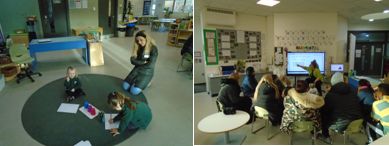
Thank you for your continued and invaluable support! 💕💕
Nursery Project -
In our Nursery project learning time, the children who attend nursery in the morning have been revisiting the ‘spindle galls’ in Forest School. They were surprised to find all the leaves with the Spindle Galls had fallen from the tree. They began to develop ideas about what may have happened to them.

The children who attend nursery in the afternoon found they gifts had gone from the holes in the tree. They wonder… are they developing relationships with the creatures or monsters who live there? How do they feel?
The children have noticed changes in the outside environment recently as part of our Forest School learning! The children have been noticing ice and frost in many areas. There have been many discussions and ideas about what this ‘white stuff’ may be and what made it happen. The children have developed their knowledge of seasons and the impact of the weather on familiar environments. The children have noticed and discussed the shapes, patterns and features they noticed on different frosty surfaces.
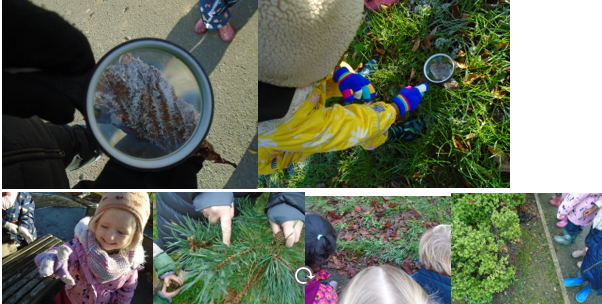

We are again, proud of the children as they have formed a more cohesive group, who are noticing each other’s learning and ideas as they become more able to collaborate in their learning.
December in Nursery
What a jam-packed month of learning and celebrations in Nursery!

Forest School -
The children have continued to notice and respond to, the changing environment as part of their Forest School learning. They have begun to discuss and share their ideas about the changing seasons and weather and their impact on the familiar natural environment they are exploring. The children have noticed and discussed the impact of the weather on their own bodies too. Children have shown concern and care for familiar features of their natural environment as they have discussed the impact of the changing seasons.
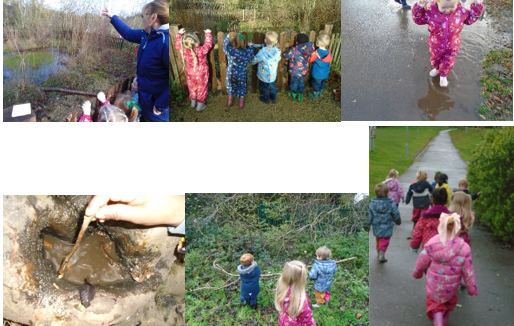
Nativity -
For much of December the children in Nursery and Reception have worked together to rehearse and then perform ‘The Wriggly Nativity’ for the rest of the children and staff in school and their families. The children have developed in confidence as they have practised and then performed in the large theatre. We are proud of the determination and resilience the children have displayed as they have worked together in their fantastic performances. Well done!!
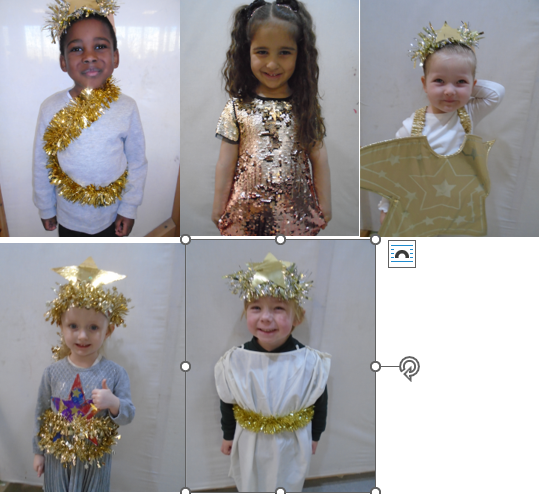
After a very eventful few weeks building up to the Nativity performances, the children have also enjoyed taking part in a range of Christmas events and activities this month. We had a Pantomime company visit and perform in school, Christmas Dinner for the children who stay all day and Christmas parties! The children also made a range of festive items to gift to and share with their families at home.
We look forward to welcoming the children back in the New Year.






